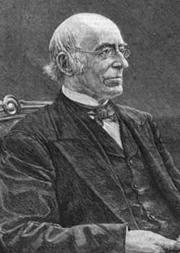December 10
William Lloyd Garrison

On this date in 1805, anti-cleric and early abolitionist William Lloyd Garrison was born in Newburyport, Mass. Apprenticed to a newspaper at age 13, Garrison took up the abolition cudgels early. Sued for libel by the owner of a slave ship, he was convicted and sentenced to six months in prison, serving seven weeks. On the nation’s 50th anniversary, he wrote, “There is one theme which should be dwelt upon, till our whole country is free from the curse — SLAVERY.” He founded The Liberator in Boston in 1831. In its pages Garrison vowed, “I am in earnest, I will not equivocate, I will not excuse, I will not retreat a single inch, and I will be heard.”
He started the New England Anti-Slavery Society in 1832, then the American Anti-Slavery Society in 1833. He was especially critical of church complicity with slavery, not only in the South but in the North. Northern denominations refused to condemn slavery or sever ties with Southern slave-holding congregations.
The South Carolina city of Columbia offered a $1,500 reward for apprehension of anyone distributing The Liberator. The Georgia House of Representatives offered $5,000 for Garrison’s capture and trial. He narrowly evaded arrest there by fleeing to England. In 1835 he was dragged through the streets of Boston by a mob. The mayor rescued him by arresting him.
Garrison was an ardent “woman’s rights man” and early suffragist. He and other abolitionists and freethinkers attended a four-day bible convention “for the purpose of freely and fully canvassing the authority and influence of the Jewish and Christian Scriptures” in June 1853. More than 2,000 attended the event in Melodeon Hall in Hartford, Conn., a majority of them hostile, including 700 divinity students.
He was not a churchgoer or believer in orthodoxy, although he was deistic. The last issue of The Liberator was published in 1865. He remained active in progressive causes, especially suffrage. He died of kidney disease at age 73 in New York City. (D. 1879)
“The human mind is greater than any book. The mind sits in judgment on every book. If there be truth in the book, we take it; if error, we discard it. Why refer this to the Bible? In this country, the Bible has been used to support slavery and capital punishment; while in the old countries, it has been quoted to sustain all manner of tyranny and persecution. All reforms are anti-Bible."
— Garrison remarks at the national woman's rights conference in Philadelphia, Oct. 18, 1854. "History of Woman Suffrage, Vol. 1" (1887)
Thomas Gore

On this date in 1870, Thomas Pryor Gore was born near Embry, Miss. As a boy he permanently lost sight in both eyes in separate accidents. Gore took a great interest in politics as a teenager and developed exceptional public speaking skills. He taught school before attending law school at Cumberland University in Tennessee. After being admitted to the bar in 1892, he joined the national Populist movement and moved to Texas to practice law.
After the Populist movement began to decline nationwide with the defeat of presidential nominee William Jennings Bryan in 1900, Gore became a Democrat and moved to Oklahoma to continue practicing law. He was elected to the Territorial Council in 1903 and, when Oklahoma became the 46th state in 1907, to the U.S. Senate. A powerful figure in the party, he served on the Democratic National Committee. He helped President Woodrow Wilson make sweeping changes to the party and turned down a cabinet position so that he could keep his Senate seat.
Gore advocated for women’s suffrage and the interests of farmers and strongly opposed railroad monopolies. His opposition to American involvement in World War I and later opposition to the formation of the League of Nations cost him his personal friendship with Wilson and the 1920 election. He successfully ran for the Senate again in 1930, when he openly criticized President Herbert Hoover’s Depression recovery policies and later opposed many of FDR’s New Deal programs. He was the only senator to vote against the Works Progress Administration. He lost his Senate seat in the election of 1936.
Gore married Nina Belle Kay in 1900 and they had two children, one of whom was Nina S. Gore, the mother of historian and author Gore Vidal. Vidal recalled that his grandfather was talked into being photographed in a Methodist Church on Sunday. Gore asked him, “ ‘Grandpa, what are we doing in this thing?’ He said, ‘Well, my boy, you may ask what we’re doing here. I’m getting votes, I don’t know about you.’ ” Vidal said Gore, asked once about the religious differences between himself and his wife, replied, “Well, one Sunday we don’t go to her church and the next Sunday we don’t go to mine.” (The Humanist, Dec. 28, 2009)
He once famously noted of his adopted state, “I love Oklahoma. I love every blade of her grass. I love every grain of her sands. I am proud of her past and I am confident of her future.” Gore died at age 78 and is buried in Oklahoma City. In September 2010, FFRF posted a billboard in Tulsa which read: “Atheism is OK in Oklahoma: Saluting Gore — First Atheist Senator.” (D. 1949)
“[H]e was a dedicated atheist. Imagine, he was senator for over thirty years in Oklahoma, a hotbed of the Lord Jesus, and they never found out. He never tried to hide it.”
— Vidal on his grandfather, interview in The Humanist (Dec. 28, 2009)
